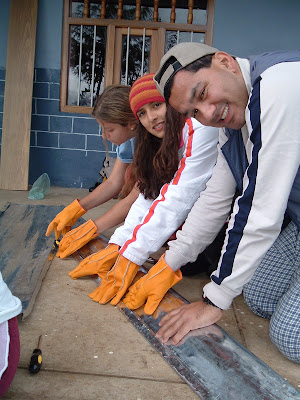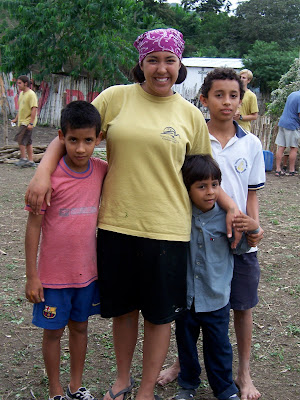Planeterra - Travel. Connect. Give Back
One of the most important things we can do while travel is to give back, which can happen in a variety of ways. You can buy and stay locally instead of in chain hotels or restaurants. You can volunteer in a community, which is called Voluntourism. International development can be helped greatly by voluntourism, which brings tourist dollars (and help) directly to the community. One of the best sites I've seen that promotes giving back, voluntourism, and sustainable tourism is Planeterra - whose slogan is Travel. Connect. Give Back.

Planeterra has initiatives with water, schools, streetkids, health projects, reforestation, micro-credit, animal conservation, and more - Planeterra has a wide range of ways to help. This is directly what we believe in here at Wandering Educators - truly helping those who need it most. We wanted to share Planeterra with our readers, so we sat down and chatted with Richard G. Edwards, Director of Planeterra. Here's what he had to say...
WE: Please tell us about your site, Planeterra...
RE: Planeterra.org is constantly updated by Planeterra staff, partners and travelers with a wealth of information, news, and personal travel stories on sustainable tourism, voluntourism and community development. It provides information on our worldwide community development projects and a secure donation site to make contributions to projects of your choice. Our online community provides users with a place to learn about latest updates, stories from travelers and our project managers out in the field. It’s also a place to share videos, photos and post blogs, which gives prospective voluntourists and international travelers a chance to get a feel for what we do. All of our voluntours are detailed on the site and potential travelers can move easily from an itinerary into the booking process or to simply view departure dates.
Take a tour with us to Ecuador where we visit Delfin and his family in the Amazon of Ecuador.
Planeterra's project here includes a community primary school that travelers can visit as well as take part in activities in the Amazon rain forest and traditional indigenous ceremonies.
Travellers can incorporate a visit to this project by staying with the family as part of their Inland and Amazon Tour with Gap Adventures.
WE: What was the genesis of your site?
RE: The genesis of our site is much like the genesis of the organization. Planeterra evolved out of travellers wanting to give back on their travels with our founding partner, Gap Adventures. Our first site was a simpler version of the present one. Our new site, launched in early 2009, was updated to include all of our voluntours, information about our international partners, and broader sustainable travel information, as well as our interactive online community.

Stove project
WE: How can travel and voluntourism contribute to sustainable development?
RE: A key tool in sustainable environmental and cultural heritage preservation is by providing people with a form of livelihood through tourism, as an alternative to developing other forms of intensive industry such as mining, industrial fishing, or logging. For example, taking a guided hike through a rainforest is much more sustainable than logging. Contributing to the local economy and improving education is a major way to increase environmental responsibility and stewardship.
Travel that involves rural developing communities, micro-enterprises and other small businesses that traditionally lack access to markets, has the ability to stimulate local economies and have a chain reaction. The dollars spent locally stay there and multiply, supporting other local businesses, which then helps to send children to school, get better healthcare, and create new businesses - a positive cycle.
Voluntourism can help with sustainable development when planned in conjunction with local partners with their best interests at the core. Working with partners to develop programs based on their capacity to receive volunteers, versus the demand for trips, is a way to positively contribute to local community development projects. In general voluntourism is an excellent way to increase intercultural learning and appreciation, and often provides necessary labor to keep projects going. We also believe in providing funding through donations to provide further stability to projects so that they are not completely dependent on visitors.

Ecuador
WE: So much of international development work seems ineffectual, or top-heavy. How is Planeterra working to be different?
RE: Planeterra is working to directly link community development projects including small community tourism businesses to the larger tourism supply chain. We help develop community tourism experiences that are market-ready by focusing project development on regions where our travel industry partners have a steady flow of travelers. For example, our women’s weaving cooperative in Peru was set up to be a business that provides an interesting place for the 25,000 Gap Adventures travelers who pass through the area each year to visit and purchase products directly from the women who make them.
We work to incorporate projects into trip routes wherever possible and encourage travelers to purchase products and donate to projects upon their return. Travelers often cite these authentic local experiences as the highlights of their trip, and repeatedly donate over the years, which allows us to support projects to the point their need diminishes and move on to help other communities.
This is different from much international development that works to develop projects without direct access to markets. Because we are a travel foundation, we work with our travel industry partners to develop projects that we know will be successful and where we know we will be able to get donations to make the strongest impact.
WE: How did Planeterra choose each project, and how does it work?
RE: Planeterra evolved organically, based on our founding partner’s desire to make a difference, and therefore projects were not always chosen to be included in tours. Currently some projects we support such as our Tibet Eye Camps and our Women’s Micro-credit project in Honduras are not accessible to visitors; however, we feel strongly about the accomplishments these projects make towards human development and therefore continue to support them. Going forward, all new projects are developed with the intent to directly include them in the tourism supply chain, either through visits on tours or through voluntours.

Peru
WE: How can a sustainable approach work with so many different cultural factors? Are there intercultural differences that you need to take into
consideration with each project?
RE: Certainly there are always intercultural differences. We have learned to work with local partners in conjunction with new projects. We routinely engage local non-profits with specialized expertise to conduct training and capacity-building, building on their already-established relationships with local communities.
We also have to take into consideration various cultural differences when developing voluntours. There can be conflicts in tourists’ behavior or style of dress for example, with local customs or religions. It is important to educate travelers on local traditions and values in order to maximize the positive interaction and minimize negative impacts.
WE: How do you suggest families give back, while traveling?
RE: Some ways families can give back are by participating in local tours, visits to local restaurants, staying in accommodations that have taken measures to be more environmentally responsible and to give back to the surrounding community in a sustainable way, which generally means purchasing goods and services from a community that is seeking to become economically self-sustainaing. They can also take the opportunity as an educational experience for children: learning some of the local language, learning how to minimize their environmental impact and learning to respect cultural differences through experiencing local customs and traditions. Additionally there are more and more opportunities for families to volunteer together.
WE: Is there anything else you'd like to share with us?
RE: We believe that travel has the power to make positive changes in the world: contributing to the well-being of rural and indigenous peoples, inspiring positive cultural exchanges, and helping to conserve the world’s natural resources through education and helping all stakeholders, including governments, corporations and travelers, to appreciate their value.
WE: Thanks so very much, Richard! I am so very impressed with Planeterra and highly recommend it to our readers!
All photos and video courtesy and copyright Planeterra.
-

- Log in to post comments


















